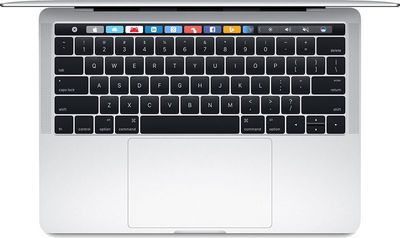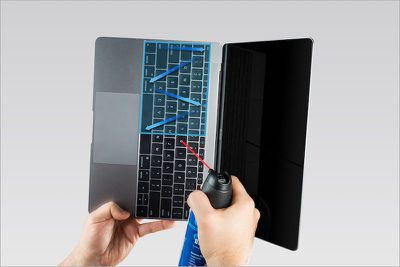Apple has been hit with a class action lawsuit over "defective" keyboards in recent MacBook and MacBook Pro models.

The lawsuit, filed in Northern California district court, alleges that the low-profile, butterfly-switch keyboards in 2015-and-later MacBook and 2016-and-later MacBook Pro models are "prone to fail," resulting in "non-responsive keys" and other issues, according to court documents obtained by MacRumors.
The lawsuit was filed by law firm Girard Gibbs LLP on behalf of MacBook Pro owners Zixuan Rao and Kyle Barbaro, residents of San Diego, California and Melrose, Massachusetts respectively.
The proposed class:
All persons within the United States who purchased, other than for resale, a model year 2015 or later Apple MacBook, or a model year 2016 or later MacBook Pro laptop, equipped with a "butterfly" keyboard.
The complaint notes that keys can become unresponsive when small amounts of dust or debris accumulate under or around them:
Apple's butterfly keyboard and MacBook are produced and assembled in such a way that when minimal amounts of dust or debris accumulate under or around a key, keystrokes fail to register. […] As a result of the defect, consumers who purchased a MacBook face a constant threat of non-responsive keys and accompanying keyboard failure. When one or more of the keys on the keyboard fail, the MacBook can no longer serve its core function: typing.
The lawsuit alleges that "thousands of consumers have experienced this defect," and highlights over 20 complaints shared by users on the Apple Support Communities, MacRumors Forums, and Reddit. The complaint also cites a Change.org petition about this issue that currently has over 22,000 signatures.
One of the comments included from a MacRumors reader in May 2015:
The C key on my new MacBook has a subtle but noticeable problem. I noticed yesterday morning that typing C wasn't always registering. I played around with the key and discovered that pressing the top of the key registered a normal click like the rest of the keys, but pressing at the bottom of the key was mushy with no click.
The lawsuit alleges that Apple is "aware of" the keyboard issues, either through "pre-release testing," customer complaints, or a combination of the two, but has "failed and continues to fail to disclose" the defect to customers:
Apple knew that the MacBook is defective at or before the time it began selling the affected models to the public. Complaints of keyboard failures began to come in shortly after the 2015 MacBook was launched. Despite awareness of the keyboard defect, Apple equipped future model MacBook and MacBook Pro laptops with the butterfly keyboard, and continued selling these laptops to consumers at premium prices.
Apple is said to "continuously monitor" complaints on websites like MacRumors:
Apple has been aware of these serious keyboard problems through the discussion pages hosted on Apple’s website as early as May 2015, the month after the MacBook was released. Apple continuously monitors those web pages. Apple also regularly monitors other web pages, including MacRumors, on which consumers complained about keyboard problems beginning on April 15, 2015, just five days after the MacBook came to market.
MacRumors first highlighted keyboard issues with the 2016 MacBook Pro over a year ago, including non-functional keys, strange high-pitched sounds on some keys, and keys with a non-uniform feel. The issues are back in the spotlight again after AppleInsider shared data on failure rates of the keyboards a few weeks ago.

The lawsuit acknowledges that Apple provides a support document with instructions to clean the keyboard of a MacBook or MacBook Pro with "an unresponsive key or "a key that feels different than the other keys," but notes that the steps "do not fix the keyboard defect or prevent the keyboard from failing."
When a customer takes their MacBook or MacBook Pro to a Genius Bar, the complaint alleges that Apple "routinely refuses to honor its warranty obligations," or is unable to permanently fix the problem when it does.
In the United States, Apple charges an out-of-warranty fee of $700 to replace the keyboard on affected MacBook Pro models, as the process requires replacing the entire top case assembly, which also houses the trackpad and speaker grilles. The fee is less if the notebook is covered by an AppleCare+ plan.
One of the two named plaintiffs in the lawsuit:
Mr. Barbaro took his laptop to the Genius Bar on September 11, 2017. A Genius Bar technician inspected the keyboard and confirmed that the space bar and caps lock keys were unresponsive. The technician offered to send the laptop to Apple's service depot for repairs. Mr. Barbaro sent his computer in, and after about one week, Mr. Barbaro received the repaired MacBook. He continued to use the MacBook for ordinary tasks until December 2017, when the space bar again became unresponsive in the same way as the first time his MacBook manifested the keyboard defect.
Mr. Barbaro returned to the Genius Bar to seek assistance. At the Genius Bar, a technician examined the laptop and determined that it would cost over $700 to repair the problem. The technician informed Mr. Barbaro that his warranty had expired and that he would be responsible for the full cost of the repairs. Mr. Barbaro declined to pay for the repairs. He still has the MacBook. It remains defective.
Apple is accused of, among other things, violating California's Unfair Competition Law and Consumer Legal Remedies Act, the Magnuson-Moss Warranty Act, the Song-Beverly Consumer Warranty Act, and fraudulent concealment.
The complaint requests that Apple pays punitive damages in an amount to be proven at trial, publicly discloses the defect, and reimburses customers for all costs attributable to remedying or replacing defective MacBook or MacBook Pro models. A jury trial has been demanded in Northern California district court.
Our Take: Apple has yet to launch a repair program for MacBook Pro keyboard issues, either publicly or internally, suggesting that the number of customers affected might not meet its threshold for doing so. But, given the increased attention and lawsuit, Apple may feel obligated to take action soon enough.


















